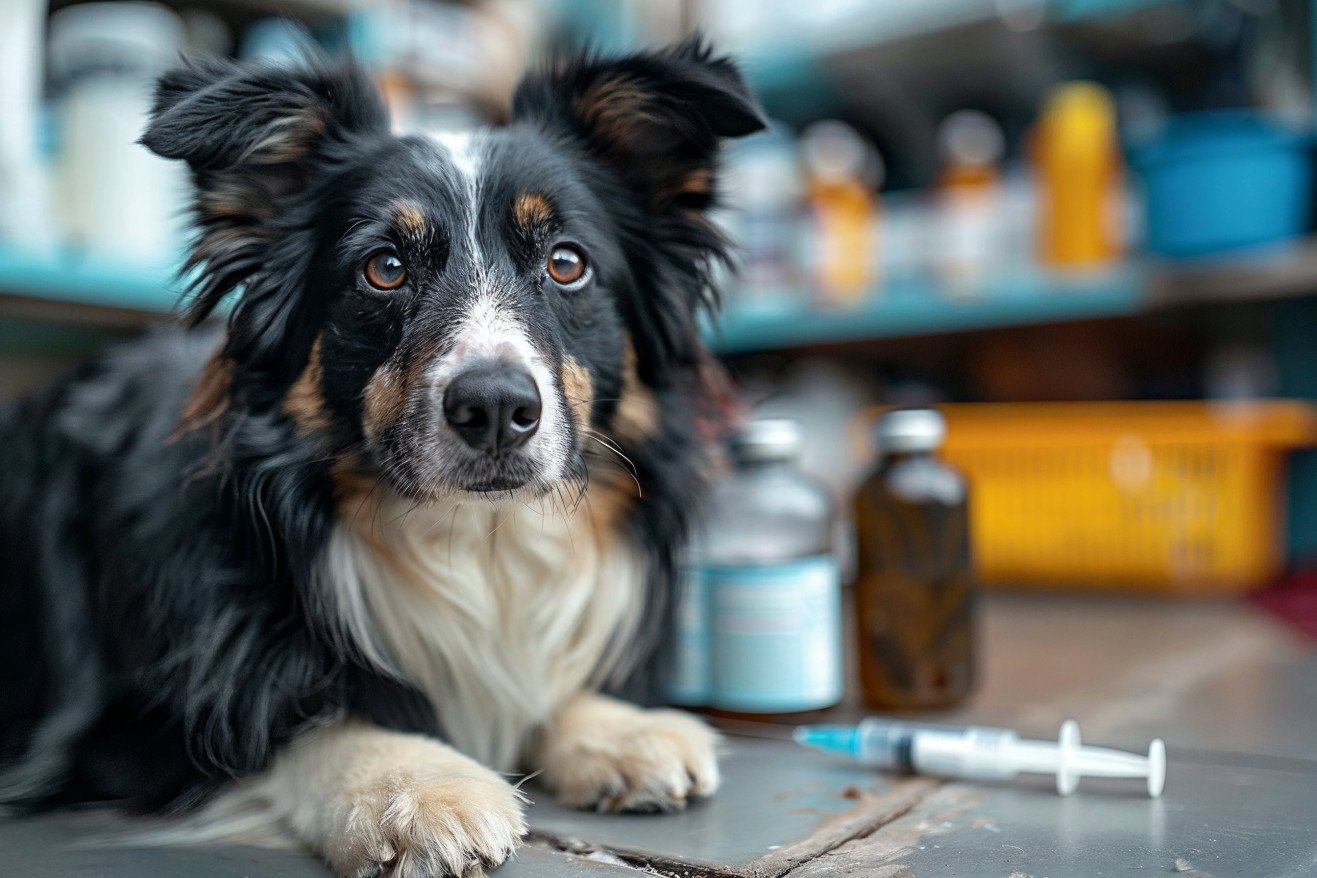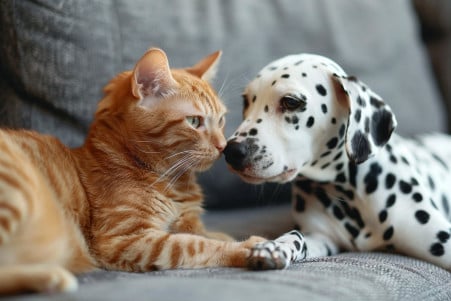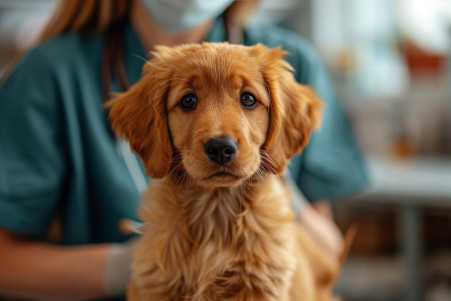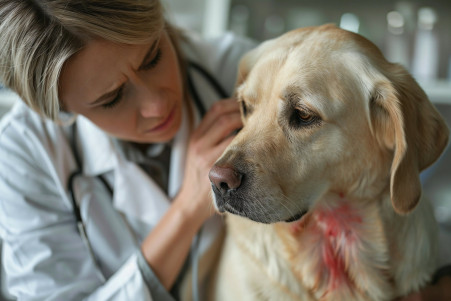Can Dogs Get Parvo Again? What to Know About Reinfection
5 March 2024 • Updated 4 March 2024

Parvovirus is a scary diagnosis for dog parents, but can your dog get parvo twice? While it’s unlikely, dogs can get parvovirus more than once. Immunity following infection is inconsistent, with some dogs having lifelong immunity and others having immunity that wanes and can lead to reinfection. That said, vaccination is still the most effective way to prevent this potentially fatal virus.
To help you better understand, we’ve looked at veterinary and immunological research to give you a better idea of what we know about canine parvovirus and the factors that can contribute to a dog’s likelihood of getting parvo again.
We’ve also looked at how vaccination impacts immunity and what happens with the immune response in dogs that have recovered from parvo. By looking at this research, you’ll be better equipped to make decisions that will help you protect your dog from the virus and understand what to do if they’ve had it in the past.
Can dogs get parvo again?
What Is Canine Parvovirus and How Is It Transmitted?
Canine parvovirus (CPV) is an extremely contagious virus that attacks the gastrointestinal tract and white blood cells, especially in puppies. According to the American Veterinary Medical Association, clinical signs of a CPV infection include severe diarrhea, often bloody, vomiting, lethargy, and loss of appetite, among others. The virus is highly resistant and can survive in the environment for months, and it is transmitted through contact with infected dogs, their feces, or contaminated objects.
Puppies between 6 and 20 weeks of age, unvaccinated or incompletely vaccinated dogs, and certain breeds, including Rottweilers and Doberman Pinschers, are at the highest risk for CPV, according to the American Veterinary Medical Association. This is because of their immature immune systems or genetic predisposition.
Treatment for CPV is supportive and can be expensive, with a focus on managing dehydration, electrolyte imbalances, and preventing secondary infections, according to VCA Hospitals. Even with treatment, the prognosis for dogs with CPV can be guarded and the long-term effects can be severe, with some dogs developing chronic health problems, including chronic gastrointestinal issues, according to a study published in PLoS One.
As we learn more about how CPV is transmitted and how it is treated in the short term, we are also learning about the importance of monitoring and care after a dog has recovered from the virus to ensure that they can live a long, healthy life.
Post-Recovery Immunity to Parvovirus in Dogs
After a dog recovers from parvovirus, there is a period of time in which the dog’s immune system produces antibodies that may protect it in the future. Immune memory is an important part of this process; it’s the immune system’s ability to remember and respond more quickly and effectively to pathogens it has already encountered.
A study published in PMC found that maternal antibodies passed on through colostrum are important for the initial immunity of puppies. However, as dogs grow, their immune systems need to react to infections like parvovirus to produce antibodies that can provide long-term immunity.
Studies have shown that the length of immunity after recovery can be quite variable.
For example, a study published in PMC found that the duration of immunity is affected by the presence of maternal antibodies.
Another study found that the strength of the immune response varied between dogs and was often associated with the dog’s size and growth rate.
Can Dogs Get Parvo Twice: Incidence and Risk Factors
While it is uncommon, dogs can get parvo a second time. Research, like the study published in PLoS One, has shown that dogs that survive a CPV infection can suffer from long-term health problems, including chronic gastrointestinal issues, that can weaken their immune system and make them more susceptible to reinfection.
Environmental factors are also important, as the virus can persist in an environment and re-expose dogs to the same or different CPV strains, which can challenge their immune system.
According to Modern Vet, immunity after infection is typically long-lasting, but some dogs may not produce enough antibodies, which can make reinfection possible. In addition, research published on PubMed by Sterner shows that vaccination can lead to immunity for at least three years, but breakthrough infections may happen if booster shots are delayed.
Understanding the factors that contribute to CPV reinfection can help improve preventive measures. This includes understanding the importance of keeping up with vaccination schedules and environmental cleanliness to prevent the return of this serious disease and help ensure a healthier future for our furry friends.
Protecting Your Pup: How Effective Is the Parvovirus Vaccine?
Vaccines are the primary way to protect dogs from parvovirus, and there are several different kinds of vaccines that work by stimulating an immune response.
Modified-live virus vaccines, which are most commonly used to protect against CPV, provide the most immunity. However, even after vaccination, breakthrough infections can happen, especially in puppies when high levels of maternally derived antibodies interfere with the vaccine’s effectiveness.
A study in Vaccines found that a new vaccine was able to induce protective immunity in puppies as young as four weeks of age, even when they had high levels of maternal antibodies. Meanwhile, a study in the Journal of Veterinary Medicine found that two commercially available vaccines were effective, but the timing of seroconversion after the initial vaccinations varied.
To reduce the risk of parvo, including reinfection, it’s important to follow a vaccination schedule that’s based on a puppy’s individual maternal antibody levels.
A study in BMC Veterinary Research found that pre-vaccination antibody titer testing can help create a more effective vaccination strategy that ensures puppies get the right protection when they need it most during their most vulnerable periods of development.
By understanding the ins and outs of dog health and keeping up with the latest in vaccine research, we can make sure our furry friends are as protected as possible from another encounter with parvovirus.
How to Take Care of Your Dog After Parvovirus
Once your dog has survived parvovirus, it is important to keep a close eye on them to make sure that they do not have any lasting health problems or a weakened immune system.
The American Veterinary Medical Association says that keeping a clean environment is key, and that cleaning your home regularly can help to get rid of any remaining viruses and prevent your dog from getting reinfected. Make sure to focus on the areas where your dog spends most of their time, and make sure to dispose of feces properly with good hygiene.
To help build your dog’s immune system back up after they have survived parvovirus, it is important to make sure that they are getting a well-balanced diet that is tailored to their specific needs.
While some dogs may need to take supplements, it is important to only do this under the guidance of a veterinarian. A study published in PMC shows that the stage of a dog’s immune system is important, and that the nutritional needs of a dog can change based on their age and health.
It is important to make sure that you are taking your dog to the vet for regular check-ups so that you can make sure that they are recovering and staying healthy.
During these visits, you can talk to your vet about your dog’s vaccination history and whether they need to be revaccinated, which is something that is shown to be affected by maternal antibodies and the timing of vaccine efficacy in a study published in Vaccines.
By doing these things, you can make sure that you are taking the best care of your dog and setting them up for a healthy future that is free from parvovirus.
In Conclusion: Can Dogs Get Parvo Twice?
After navigating the ins and outs of canine parvovirus, it’s clear that while it’s not common, dogs can get parvo twice. The immune system’s response to the initial infection is important because it produces antibodies that are supposed to offer long-term protection, says Modern Vet. However, this immunity isn’t always successful, and issues like low antibody levels can make dogs more susceptible to a second infection.
Vaccination is the first line of defense against parvo, and Modern Vet says it’s important to keep up with a regular vaccination schedule to help ensure immunity. However, as the Worms & Germs Blog explains, no vaccine is 100% effective, and while it’s rare, vaccine breakthrough cases in fully vaccinated dogs can occur.
Preventative measures, including good hygiene and an understanding of environmental factors, are also important in helping to protect our canine companions from this highly contagious disease.
In the end, continued research and responsible pet ownership are key to preventing parvovirus and keeping our beloved dogs healthy. It’s the collaboration between veterinary medicine and pet owners that will help keep our animals safe from parvo, whether it’s the first time they’re infected or the less likely second time.


